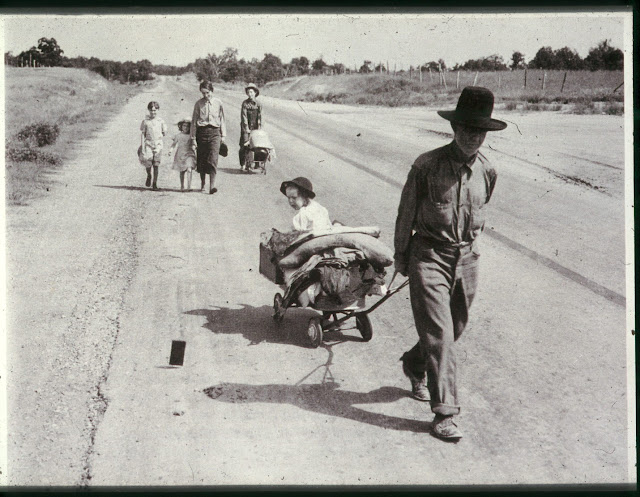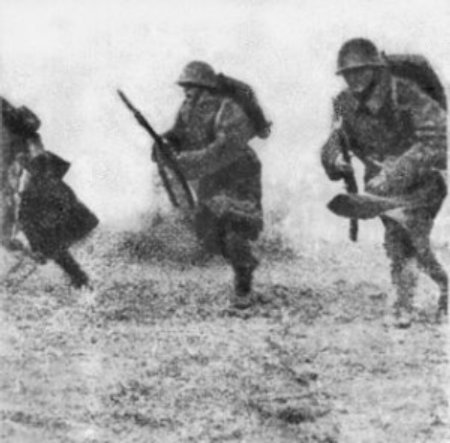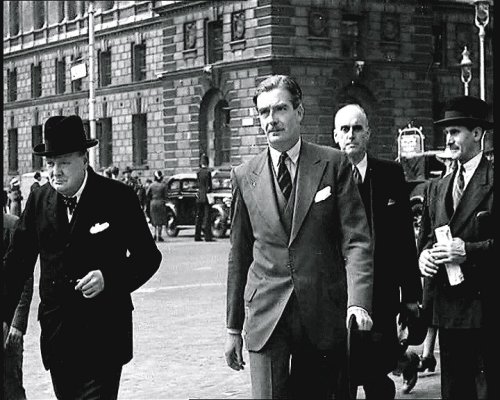Monday 29 January 1940
 |
| HMS Achilles steams past the wreck of the Admiral Graf Spee, 29 January 1940. |
Winter War Air Operations: The Soviets launch sharp air raids along the coastal towns on the Gulf of Bothnia. At Hango and Turku, two of their favorite targets, they cause extensive damage. At Hango, 50 perish and 200 are injured, whereas at Turku, 28 men perish and 46 are injured. In addition, the Soviet bombers, perhaps mistakenly, bomb the Red Cross hospital on the Karelian Isthmus, killing 23.
Winter War Peace Talks: The Soviets for the first time send a note to Alexandra Kollontai, their ambassador in Stockholm, for transmission to the Finnish government. The note indicates that they are willing to at least sit down with the Finnish government and talk about things:
The Soviet Union has no objection in principle to a possible agreement with the Ryti government.This appears to end the Soviet pretense that their puppet government staffed by former Comintern members is the "legitimate" Finnish government, which nobody took seriously anyway. The Soviets are preparing a major offensive, so the sincerity of this offer is highly suspect - unless the Soviets consider it to be a prelude to surrender negotiations.
Battle of the Atlantic: The British Admiralty warns US ships not to enter the war zone previously established by President Roosevelt.
U-51 (Kapitänleutnant Dietrich Knorr) torpedoes and sinks 1,503-ton Norwegian freighter Eika south of Ireland out in the Atlantic at 15:00. Fourteen perish, 2 survive. Knorr states that he saw no neutral markings and that the ship was using a zig-zag pattern. At the last moment, he states, it aimed right at his U-boat and tried to ram it, so he had to sink it. The German Government sends the Norwegian Department of foreign affairs a note stating:
The circumstances leading to the torpedoing of the steamship Eika is a typical example of what the consequences can be for neutral ships when they do not pay heed to the German Government's repeated warnings against un-neutral or suspicious behaviour.Knorr's account is disputed in all particulars. What is not disputed is that Knorr stops and carries the two survivors, Harald Støle (age 16) and Alfred Johansen, with him until returning to Bremerhaven. The two Norwegians ultimately get home after returning to port on 14 February and state they were treated well by the Captain and crew. There is a memorial in Stavern, Norway for the ship and its crew.
Luftwaffe Heinkel He 111 bombers sink two British merchant ships between the Shetlands and Kent, the Stanburn and the Leo Dawson (assumed to be the Luftwaffe). They also bomb the unarmed "East Dudgeon" lightship, killing seven of the eight-man crew when it capsizes near shore. There were other attacks on British shipping that damage and sink some smaller craft.
The British detain US freighter Exochorda at Gibraltar.
Convoy OA 82 departs from Southend, and Convoy OB 82 departs from Liverpool, while Convoy HG 17 departs from Gibraltar.
German Military: Admiral Raeder, who is leading the planning for Weserubung, declares the Friesian Islands as military security districts. All local inhabitants are removed.
German/Italian Relations: The Germans release Italian aircraft destined for Finland that they had detained.
French Homefront: Premier Daladier delivers another emotional speech in a national broadcast, stating: "Germany hopes to encompass our downfall by exploiting the weakness at home …" It is a common refrain from him, as he sees the internal enemy of communists working in conjunction with Stalin as a huge threat, perhaps even greater than the Germans.
Holocaust: The Polish Government-in-exile releases a report estimating that 18,000 Poles drawn from all segments of society have been executed in occupied Poland.
Future History: Katherine Ross is born today in Hollywood, California. She becomes famous in the 1960s as an actress in such films as "Butch Cassidy and the Sundance Kid." She remains active in the television/film industry as of 2016 in shows such as "Family Guy."
 |
| Lana Turner is the cynosure of all eyes today in Life Magazine. |
January 1940
January 1, 1940: Finns Carve up the SovietsJanuary 2, 1940: Finnish Counterattacks Continue
January 3, 1940: Soviets Trapped
January 4, 1940: Soviet Breakout Attempts Fail
January 5, 1940: Dicing Up the Soviets
January 6, 1940: Soviet 44th Division Runs
January 7, 1940: Shakeup in Soviet High Command
January 8, 1940: Ratte Road Battle Ends
January 9, 1940: British Submarines in Peril
January 10, 1940: Mechelen Incident
January 11, 1940: Finns Surround More Soviets
January 12, 1940: New Soviet Attacks at Taipale
January 13, 1940: Fall Gelb Postponed
January 14, 1940: Japan's Government Falls
January 15, 1940: Soviets Prepare More Carefully
January 16, 1940: German Atrocities Uncovered
January 17, 1940: Bletchley Park in Action
January 18, 1940: New Hope for Allied Shipping
January 19, 1940: Finnish Attacks at Salla
January 20, 1940: Churchill Urges Cooperation
January 21, 1940: Asam Maru Incident
January 22, 1940: Dissension Within British Government
January 23, 1940: Dissension in South Africa
January 24, 1940: NKVD Blocking Detachments
January 25, 1940: Auschwitz Site Selected
January 26, 1940: Millionaire Bunker Destroyed
January 27, 1940: U-20 Sinks Four Ships
January 28, 1940: Softening Up the Finns
January 29, 1940: Moscow Willing to Talk
January 30, 1940: Hitler Throws Down the Gauntlet
January 31, 1940: Timoshenko Is Ready
2019

















